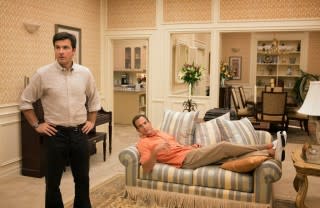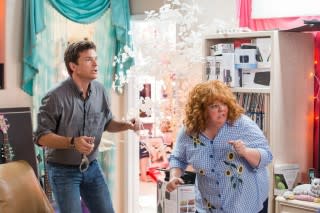EMMYS Q&A: Jason Bateman
Anthony D’Alessandro is Managing Editor of AwardsLine.
The growing pain of a child actor eventually building their career as an adult is often a gamble, potentially taking a toll on their personal and professional lives. But then there are triumphs such as Jason Bateman. Once a centerfold in teen magazines for his pungent personas on such NBC ‘80s sitcoms Silver Spoons and It’s Your Move, Bateman transformed into a bankable leading man in feature comedies such as Couples Retreat and Horrible Bosses, thanks in tremendous part to his role as Michael Bluth, a decent, single father who is surrounded by the idiocy of his conniving, affluent family on the Fox millennial sitcom Arrested Development. Netflix revived the show this spring with a fourth season to mixed reviews and a moderate bump in subscribers. Nonetheless, 2013 is shaping up to be a banner year for Bateman: Not only did he earn his second Emmy nomination as lead comedy actor for Arrested Development, but his first production under his Universal label Aggregate Films, Identity Thief, was a solid winter hit ($174 million global B.O.). Next week, he’ll premiere his feature directorial debut, the dark comedy Bad Words, at the Toronto film festival, in which he also stars. And in two months, he’ll begin production on Horrible Bosses 2. Bateman spoke with us about the challenges with the fourth season of Arrested Development as well as his multi-hyphenate career as a producer and actor.
Related: EMMYS: Comedy Lead Acting Handicap
AwardsLine: Why did you decide to return to Arrested Development? It’s not common for a marquee box office star in your position to return to a TV show he once headlined and make a 15 episode commitment. If you said ‘No’ the whole show might not have occurred.
Jason Bateman: Well, it’s not lost on me that this show was a rebirth for me. Without that show I’d be parking cars somewhere. There was a certain sense of wanting to do it out of loyalty as well as the fact it was one of the best jobs I ever had. So, to be able to work with all these people again and in the same capacity, it was a no brainer for me. So, I had no trepidation about it whatsoever, except for the format we were going to do. (Arrested Development creator) Mitch (Hurwitz) explained to me that it was going to be one episode per character and I thought, ‘I’m not sure that people are going to really love that.’ I’m willing to offer my services to be in every episode if you want, and if that seems budget-arily impossible, let’s not worry about that and I’ll make it work. One of the things that was so structurally great about the Fox show was that Mitch had this normal guy (in Michael Bluth) being the lense from which you experience this eccentric family. Without that proximity to the audience, without that person to tether all this eccentricity, it might effect the show negatively. I told them if you want to put my character in every episode, we’ll make it work. And so, that’s why I’m in every episode. Once Mitch said, that’s the way it was going to go, I thought this has a chance of working. Unfortunately, not all the critics really embraced the difference he was going for on the show. He wanted to do something that was unique to the platform of Netflix; all these episodes get released at the same time and there was going to be functionality for the viewer to stop one episode and start another one and be able to watch them in any particular order, like a ‘Choose Your Adventure’-type thing. That ultimately was something he could not make work editorially and did have to dictate an order to watch the show. Perhaps that’s what the critics bumped up against: The complexity of the narrative was not necessarily justified or supported by this ability to watch the episodes in any particular order.
Related: EMMYS: Comedy Supporting Acting Handicap
AwardsLine: Hurwitz’s decision to anchor an episode around one character – was that largely dictated by the cast’s sliding salary structure? [Editor’s note: An actor starring in an episode made $125,000 per, a non-starring appearance at more than 90 seconds earns $50,000 per, less than 90 seconds is $10,000 per].
Bateman: Absolutely not. It was an attempt to make it as financially palatable for those cutting the checks to make the episodes. Obviously, Mitch gave us all careers and we went on to create quotes that would make all of us coming together at our current quotes, impossible. So that, coupled with the fact that there were many cast members who were contractually unable to go on another series. It was a fairly complicated thing from a business and creative standpoint to take on. He managed to pull all of this off. It was disappointing that he wasn’t given at least an Emmy nomination for the effort. I was really surprised at that. He tried to do something that was ambitious to say the least and he was successful pulling it off. I would have thought that there would be appreciation for that, but maybe that’s later.
Related: EMMYS: Comedy Series Overview
AwardsLine: Years ago when your agent first told you about the role of Michael Bluth, were you looking to play the straight man? You carved this great persona as a child actor playing the sarcastic, sassy guy.
Bateman: I was looking for a job. Period. I had recently made an agency change and my old agent told me two months after we parted, ‘Hey there’s pilot being cast and I noticed you haven’t been on any of the casting sheets and it’s a perfect role for you and you might want to tell your new agents about it.’ I thanked her profusely, said it was ‘classy of you to pass that on to me.’ So my new agents said ‘Yeah, it’s never going to get picked up, it’s something that’s very left of center to say the least.’ The cover letter on the script said this is very running gun-guerilla stuff, there’s not going to be any make-up, marks on the ground and no lights. If your client isn’t ready to rough it, don’t bother submitting them. I read it, and it was something I was really attracted to. It was at the time when multi-camera was really losing the race to single camera comedies. I thought they’re never going to see me because I carry a lot of multi-camera baggage. They were even going past the whole single camera thing and doing a mockumentary style. Ron Howard was the producer and narrator on this, and I thought there is no way they want my stink on this. Fortunately, Mitch had seen me for something else a few years earlier. I went in there and played the part the way I would like to see it played and guessed right. He liked that. Fortunately, the part called for a very dry, straight, fatigued guy. And that’s my sense of humor. My mother is British, so everything is dry. Doing multi-camera work is sneaky tough and it’s a talent unto itself, but I always laugh more at the Gene Wilders, Bill Murrays and John Cleeses of the world than guys acting for the back row.
AwardsLine: The show takes off, and you start getting straight man roles in studio comedies. Are you landing these roles based on your character in Arrested Development, or are you seeking these roles out?
Bateman: I think you get the parts that people are comfortable with seeing you play. I get that. And I don’t shy away from those parts for a couple reasons. That straight man character is a short trip between comedy and drama in a project, so I can play the comedic beat on the same page as a dramatic beat. It gives me a lot of freedom as an actor to play scenes in multiple ways because I don’t play the clown nor do I play someone who is particularly maudlin. So, I like that part. It lets me do both. It also asks me to be in a lot of scenes so there’s a lot of responsibility I have on those projects, because I’m the glue, the tether between all storylines and characters. Because when you’re the straight man, you are usually the eyes and ears of the audience. It’s probably why I’m attracted to directing. It demands that you have a full understanding of the script, the story and the tone. You’re able to guide, manipulate and execute the tone of all scenes and sequences. Now do I like some of the more interesting supporting parts? Absolutely and I would love to do more of those, but I’m understandably not thought of first for those parts. There are some incredible character actors who get those calls first. I would like to do more of those, but I’m getting some flattering opportunities to continue to play a bigger part in some productions with some fantastic people. It’s hard to say ‘No’ to those. The truth is: That’s me. I’m a pretty normal guy. I’m really good at knowing how a normal guy would react in situations. If the goal is to be believable when you’re acting, I’ve got the best idea of what that believability might look and feel like. And because you need a normal guy in a comedy, so that the eccentricities can pop, that’s a good part for me.
AwardsLine: Hurwitz mentioned that he took part of what was supposed to be in the original feature film and carried it into Season 4. How did that impact your storyline? Were you always expected to be in a love triangle with your onscreen son George Michael (Michael Cera)?
Bateman: I’m not sure because there wasn’t a movie script. Mitch had a movie outline that each time he tried to write out, he’d get to page 70 before he hit the new saga. He spent the first 70 pages catching everyone up where these characters have been for seven years and informing those who were uninitiated to the Fox show. So, he thought, this feature is going to be too long, so let me take the first act and turn it into episodes. That’s why every actor got their own episode. That’s where that ‘Choose Your own Adventure’ thing came about. So, if you’re watching me and I’m driving down the street and I pass by Gob (Will Arnett) on a Segway, you can click out of my episode and click into his and see where he’s going. (The plan was) We all end up the same place and from there that launches the movie. So it was misnomer, an improper label that the press put on these episodes as the fourth season. It was never a fourth season. They were episodes that set up the second and the third act of the movie which is next to come. So it’s a three act saga Mitch wants to tell. He took the first act out of the script and put it in these Netflix episodes. What I understand is that it’s going to be a two-hour movie for theatrical distribution or for Netflix. This will (feasibly) allow the cast to be on the screen at the same time and get around all those contractual barriers that prevent other cast members from appearing on other shows. Maybe that will be in the next year or so. My original pitch was to do a Michael Apted 7 Up thing where every seven years we check in with the Bluths to see where they are at.
AwardsLine: Between contracts and other actors’ schedules, how long was it before you had a shooting schedule?
Bateman: It was a complicated process that they never had rock solid, not only leading up to production, but throughout production. There was a lot of really good work done by the line producer and first A.D. juggling everyone’s availability. All I knew was that I could give them 24 hours a day up until a certain date which was when I needed to be shooting the film I was directing then Bad Words. That could have created a deadline for them to hit, and perhaps pushed the rock a little faster.
AwardsLine: When you shot Arrested Development, was it in tandem with Identify Thief?
Bateman: Identity Thief had finished and I was staring prep on (my feature directorial debut) Bad Words. I had to finish all my Arrested Development shooting inside pre-production of Bad Words. I had to wrap my Arrested Development stuff two days before we started shooting Bad Words because I had to shave my hair for that movie. I wrapped Arrested on a Friday, shaved my head on a Saturday and started shooting Bad Words on a Monday. I went to do additional scenes on Identity Thief and had to put a wig on for that. That wasn’t fun.
AwardsLine: How many months was your Arrested Development shoot?
Bateman: Four weeks of work for me. They front-loaded me on that. They shot I think close to four to five months (overall).
AwardsLine: When you first heard the show was going to be on Netflix, did you think that was risky?
Bateman: Well, when Mitch explained that there was really no way for us to get the film completed because of the story we wanted to tell, he told me we’ll spread this first act out into episodes. He talked to me about the Netflix component and what a great guy Ted Sarandos was. Netflix was vying to bring quality, original programming to a digital platform. As a fan of the industry and someone with friends who’ve lost jobs due to the downsizing of the business, if Netflix could pull that off, it would be a whole new network. It would mean more jobs, more content and it was privilege to be part of something at its conception.
AwardsLine: Are the actors paid on bonus clicks? If an episode is viewed beyond a certain limit, is there a payoff?
Bateman: I don’t think so. Since Netflix, very intelligently, doesn’t disclose their analytics there would be no way to follow that.
AwardsLine: Were you surprised that the show didn’t get a number of Emmy nominations?
Bateman: It wasn’t surprising to me given the mixed reviews that the show received, which unfortunately started with The New York Times guy rushing out with his review after admittedly watching a few episodes. How do you read the first few chapters of a book and give it a review or watch the first 20 minutes of a movie and give it a review? I recognize the fact that Mitch was unable to send out all the episodes for the critics to review beforehand. It was still made pretty clear that this is something that can’t be fully understood or judged until you get to the end. Yes, that obligates you to 8 or 9 hours of viewing, but isn’t that your obligation as a critic? The New York Times is a reputable company and it’s surprising that they would allow that irresponsibility. Unfortunately, the lesser critics went along with the Grey Lady. It started a bit of an avalanche of negativity. It balanced out a bit, but I wasn’t surprised that the Academy was gun shy. I was surprised that I along with the editing and the music were the only nominations. That was a shocker to me. I thought Mitch and the show was going to get one.
AwardsLine: Tell me a little about your feature directorial debut Bad Words. You play a man who gets revenge for a spelling bee that he lost as a child.
Bateman: In the movie that’s what everyone thinks. The reason for what he’s doing is revealed two thirds of the way through and it ends up being a fairly justifiable reason and it’s somewhat redemptive and you have empathy for him and start rooting for him. Up until then, he’s a guy with some real edges to him and he’s a real misanthrope. He’s a bastard to these kids. There’s a Bad Santa element to it. What was attractive to me was that it was comedic as a result of the vulnerabilities and lack of dignity that this guy experiences because of his emotional state. He’s not pulling a prank. This is a moment of impulse and petulance for him that winds up being pretty entertaining. That lent itself to a production design, a score; a whole tone that lives more in the human condition comedy I like as opposed to conceptual or comedic vehicles.
AwardsLine: As a dark comedy, was it difficult to finance?
Bateman: This was a real easy number. It was under $10 million, shooting schedule was 29 days and we had a great partner in Darko that was straight equity. They don’t impose themselves overly in the creative process. It was stunning the trust and freedom I had.
AwardsLine: In the wake of the success of Identify Thief (global B.O. $174 million), your first production under your Universal deal, has it been easier to get some of your other non-commercial projects off the ground?
Bateman: The Joe Carnahan project (Cross Brothers) we’re changing into a TV show. Under The Banner Of Heaven which Ron Howard is attached to direct; that’s something that Dustin Lance Black is doing another draft of. There are a handful of other projects with Universal and other studios that are post Identity Thief. It’s been nice stepping into this producer world and I’m given the opportunity to work as hard as I want to. What’s frustrating as an actor, when you want to work hard, you can only work once that phone rings and then you can only work until the production wraps. Then you have to find another job.
AwardsLine: Are you currently booked two years out?
Bateman: Yes and no. There are things on the five yard line and based on one call, that’s 18 months gone. There are a lot of projects that are in the oven that I’m proud of and I’ve gotten the opportunity to grow from the ground up. It’s a privilege to be able to build the company (Aggregate Films) even bigger.
AwardsLine: Do you have a sense of what comedic concepts work at the box office and those that don’t? You segue between huge hits like Identity Thief and smaller films like The Switch ($50 million global B.O.).
Bateman: In regards to The Switch, Jennifer Aniston is a massive celebrity and not by her own choosing. The celebrity media builds her up out of their own self-interest so that they can sell magazines, but she doesn’t pursue that at all. Being such a big celebrity, if her films don’t make millions of dollars, they’re (perceived as) a failure with no regard whatsoever to the initiative of the film or its budget and The Switch’s budget was so low. It was an indie in its premise. But because it was somewhat of a marketing attempt to get an opening that was Aniston-esque, I think it was a disservice to set that profile for it, because if it didn’t hit that that number, it would look like it underperformed.
AwardsLine: In terms of broad comedy concepts – can you detect what’s accessible and what will perform well?
Bateman: If anybody did know, they would rule the world. I’m a filmgoer and I certainly know, except for the fourth quarter, the decision of what you’re going to see is pretty arbitrary. Let’s take Identity Thief vs. The Change-Up ($37 million domestic, $38 million foreign B.O.). If somebody asks, ‘Do you want to see the movie about the two guys that switch lives or the movie about the lady who steals the man’s identity?’ I want to see the one about the lady who steals the man’s identity because I haven’t seen that and it sounds like it could be a challenge for both of them. I would like to see them get out of that, whereas two guys switching lives, I’ve seen that quite a bit. ‘But it’s the R-rated version.’ Yeah, it’s still not a good enough reason. Change-Up tested huge, but it’s not a merit-ocracy. The movie won’t open based on the concept. Whereas you get people in there based on a concept that’s kind of fresh, and then people actually have a good experience while they’re in there, then we’ll talk about it and it will have playability and play for 17 weeks. If you can’t get past the concept, it’s tricky to play fortune teller with. Everyone tries to, but ultimately you never know.
AwardsLine: So then why did you decide to do Change-Up? Obviously you and Universal don’t go into these projects to fail.
Bateman: We really thought, yeah, it’s a body switching movie, but it’s the R-rated version and no one had ever done that before. Wouldn’t you get into a lot of R-rated situations if you could switch bodies with someone? We said ‘Yeah, let’s go do that.’ Unfortunately, the familiarity of the concept superseded any sort of weakness before anyone could get in with the R-rated. Simple math, but that’s my guess. The reason why I wanted to do it was A.) the fact that we were doing an R-rated version would be appealing, but even more importantly, sort of selfishly, I rarely get the opportunity to play the antagonist. I start as the straight guy and switch bodies and then I’m the freak. It was an organic way for me to play that character because I start as the guy you expect me to play. The script was incredible, but unfortunately it didn’t have a lot of box office success.
Related stories
Movie Talk Heats Up For ‘Arrested Development’: TCA
Get more from Deadline.com: Follow us on Twitter, Facebook, Newsletter




